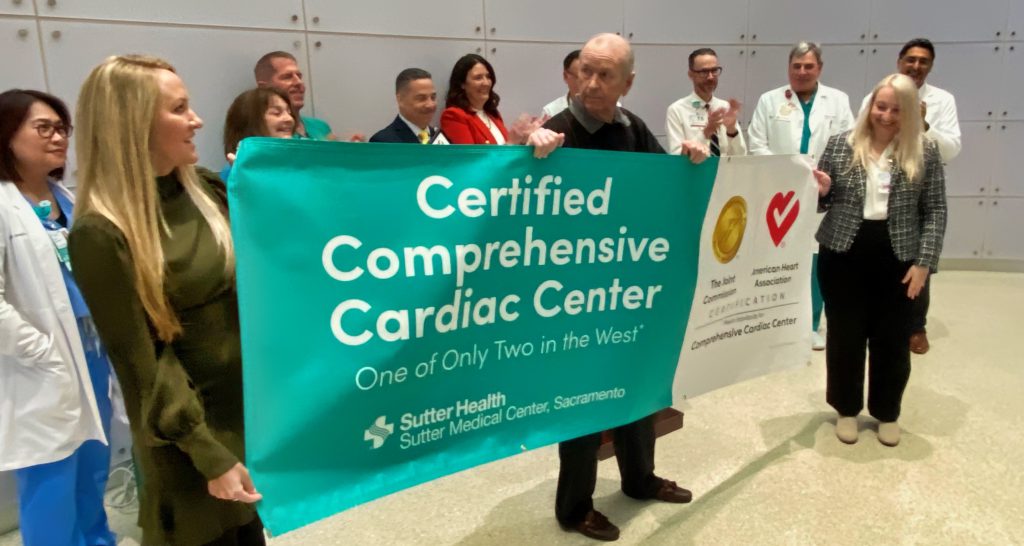Temperatures are soaring, wildfires are burning out of control and spewing toxic smoke, and yet another surge of COVID-19 is upon us. You could be forgiven if you think this summer seems a lot like a sequel to last year’s disaster movie of a summer.
There are a few key differences between summer 2021 and summer 2020, however. The most important is the availability of safe and effective COVID-19 vaccines for everyone age 12 and over in the United States.
We’ve also learned more about how to protect our health as wildfire season ramps up.
With wildfire smoke again settling in the greater Sacramento Valley, and with the delta variant of COVID-19 fueling a fourth surge of infections, Dr. William Isenberg, Sutter Health’s Chief Quality and Safety Officer, has advice on the best way to avoid the associated health risks of this double-whammy: Get vaccinated if you haven’t already, and if wildfire smoke is affecting air quality in your community, consider taking the following precautions.
- Stay indoors as much as possible, limiting opening of doors and windows.
- Use air conditioning in your homes and vehicles, if you have it. Malls are great places for people without their own air conditioning at home.
- Do not run fans that move smoky outdoor air inside, such as whole-house fans. If your home is equipped with an automated venting system, make sure you turn it off.
- Keep well–hydrated. Dr. Isenberg recommends drinking a minimum of 8 ounces of water eight to 10 times daily.
- Use your maintenance puffers/inhalers if you have asthma, emphysema or other respiratory diseases, and carry your rescue puffer/inhaler with you if you leave your home.
- To help protect against COVID-19, wear a cloth or surgical mask. To help protect against both COVID-19 and wildfire smoke–which has tiny particles that cloth masks aren’t able to catch– CDC recommends an N95 or KN95 mask.
For more information about how to protect yourself from the virus and wildfire smoke, read the CDC’s page Wildfire Smoke and COVID-19, which is also available in Spanish.
Air Now.gov offers information about how to protect yourself from wildfire smoke, along with a chart that pinpoints the Air Quality Index of your town.
Some Are More at Risk from Smoky Air
Especially at risk of lung issues from the smoke are children, the elderly, those with underlying respiratory and heart issues, and pregnant women.
“Inhalation of this wildfire smoke can cause premature labor,” Dr. Isenberg says. But he reiterated that prolonged exposure to all this smoke can cause queasiness and heart attacks to even those who are not high risk.
For people who experienced breathing and respiratory problems brought on by previous years’ wildfire smoke, a San Francisco health expert cautions that these individuals should be extra vigilant with their health while COVID-19 is among us.
Vinayak Jha, M.D., a pulmonologist affiliated with Sutter’s California Pacific Medical Center (CPMC) says, “There’s some reason for concern that wildfire smoke, besides being bad for people in general, may affect people’s susceptibility to getting the virus.”
Dr. Jha says breathing in wildfire smoke can cause shortness of breath, coughing and sore throat, and that having the coronavirus may worsen symptoms. Having respiratory problems combined with air pollution from wildfires is not an ideal situation.
As the fire seasons heats up, Dr. Jha says COVID-19 patients should keep in close contact with their healthcare provider and avoid exerting themselves, especially if they are at the beginning of the illness.
“Continue to socially distance, and continue to wear a mask in public,” says Dr. Jha. He especially encourages knowing how to check the Air Quality Index, checking your home air purifying system to make sure the filters are clean, and having a plan in case you need to leave the area.
Pulmonary Care
In the Sutter Health network, pulmonary specialists have deep expertise in treating acute and chronic lung conditions, including asthma, bronchiolitis, emphysema and pneumonia. They offer treatment for interstitial lung disease, advanced COPD (Chronic obstructive pulmonary disease), pulmonary nodules and pulmonary hypertension.
Sutter Health is committed to your health and safety. If you need care, make an appointment today. Care teams are ready to serve you, either in person or by Video Visit.
Learn more about getting care during COVID-19 here.





